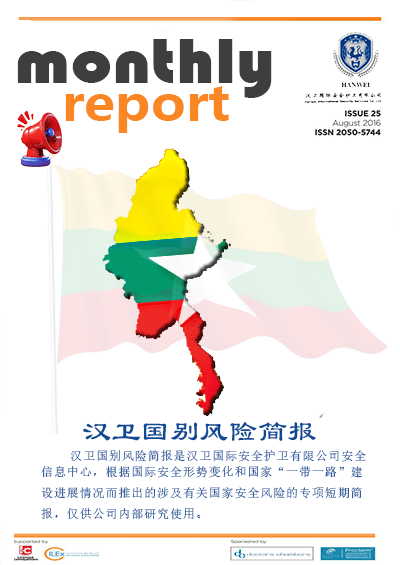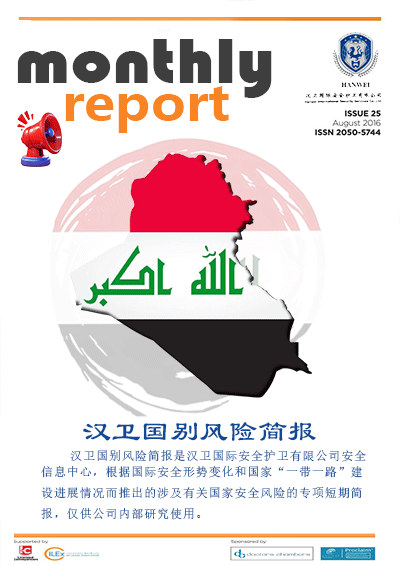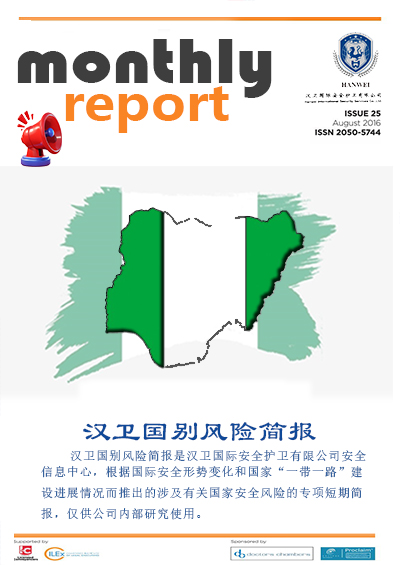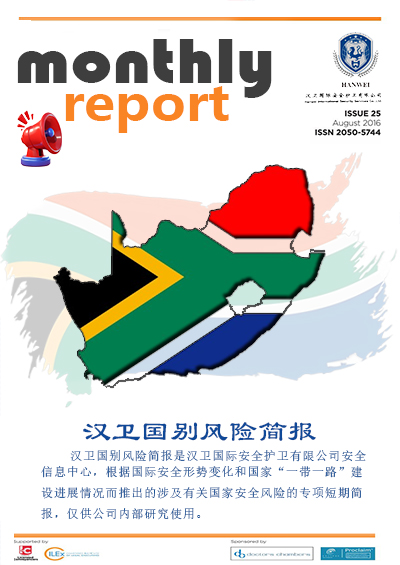Iraq Security Situation Overview (September)Researcher No. 006
Based on monitoring reports from Hanwei International's security officers stationed in Iraq and relevant media coverage, Hanwei International's analysis concludes that Iraq is facing a complex and severe security situation. In terms of politics and economy, the Iraqi Prime Minister is facing a parliamentary inquiry for failing to submit the budget proposal as required, which has affected governance efficiency; Iraq is grappling with a dual crisis of water scarcity and pollution, with water quality issues further exacerbating people's livelihood pressures; protest activities have erupted frequently in multiple regions, highlighting prominent contradictions in people's livelihoods and politics. In terms of social security risks, frequent violent crimes such as shootings, robberies, and bomb attacks pose a severe threat to the lives and property of the people. In other aspects, the continued U.S. military presence in Iraq, the test-firing of Israeli missiles, and the designation of four Iraqi armed factions as terrorist organizations have continuously intensified domestic and foreign security risks; the Kurdistan Region has called for the unification of military personnel benefits, presenting both opportunities and challenges.
I. Politics and Economy(1) Iraqi Prime Minister Faces Inquiry Over Budget Issue, Highlighting Tensions Between Executive and Legislative BranchesOn September 2, 2025, as the government failed to submit the 2025 federal budget document within the stipulated timeframe, Mustafa Al-Karawi, a member of the independent parliamentary group "Al-Siraj Al-Qanuni" (Legal Dawn), announced the completion of an inquiry into Prime Minister Mohammed Shia' Al-Sudani. Concurrently, the parliament launched an oral inquiry into Finance Minister Taif Sami. The group pointed out that the Al-Sudani government had committed multiple violations, including failing to submit the budget document, failing to disclose final accounts, and delaying the implementation of the *Federal Civil Service Law*. Among these, the current-year budget is a crucial component of the first multi-year fiscal plan passed in June 2023, directly impacting fiscal management, long-term investment planning, and the timely payment of salaries to public servants. The initiative by the "Al-Siraj Al-Qanuni" parliamentary group to launch the inquiry signifies that independent parliamentary forces have strengthened oversight of the government, while also exposing the insufficient execution capacity of the executive branch. The delayed submission of the current-year budget has directly affected the payment of public servants' salaries and led to gaps in public services. The *Federal Civil Service Law* has further heightened public servants' dissatisfaction, which could easily trigger large-scale protests and escalate social contradictions.
(2) Water Crisis: Dual "Blow" of Scarcity and Pollution Water ScarcityAccording to official data released by Iraq in mid-September, the actual inflow of water into the Tigris and Euphrates Rivers has dropped to less than 35% of the historically allocated volume. Among them, the water level of the Euphrates River has fallen to its lowest point in decades. Shamal, a spokesperson for the Ministry of Water Resources, stated publicly that the total water storage in the country's man-made lakes has plummeted from 10 billion cubic meters at the end of May to less than 8 billion cubic meters, accounting for only 8% of the total storage capacity—setting a record low since national records began. The sharp decline in water volume is the result of multiple factors: the continuous impoundment of water by dams on Turkey's side of the upper reaches; and during the summer of 2025, Iraq experienced temperatures exceeding 40°C for more than 50 consecutive days, with river water evaporation increasing by 12% year-on-year.
Water PollutionSince September, algal blooms and eutrophication have occurred in the Euphrates River basin. Meanwhile, the Shatt al-Arab in Basra has suffered severe seawater intrusion due to freshwater scarcity, with the river's salinity exceeding ten times the standard set by the World Health Organization (WHO). The water crisis has dealt a severe blow to Iraq's agriculture and people's livelihoods. In the agricultural sector, Dhi Qar Governorate has completely suspended wheat and rice cultivation, which is expected to lead to a 30% reduction in national grain production. In terms of people's livelihoods, some regions are facing the dual pressures of water pollution and soaring prices. Gangs are exploiting high-priced water tankers to profiteer, which could further exacerbate social unrest.
(3) Frequent Protests: Dual Dilemmas in Livelihoods and Politics Livelihoods and EmploymentOn September 1, dismissed oil workers, who had been holding a sit-in protest for five months outside the southern Basra oil refinery, escalated their demonstration by blocking the refinery gate and demanding formal employment. On September 2, newly deployed security forces broke through the gate, dispersed and assaulted the protesters, causing multiple injuries. On September 3, oil-related graduates staged a protest in front of the Basra Oil Company, demanding priority employment for local residents. Hassan Al-Shawi, a protest representative, warned that if their demands are not met, the seven-month-long protest will escalate further.Political ViolenceOn September 11, civil activists in Sulaymaniyah, Kurdistan Region, held a rally to condemn the security chaos in the city caused by political struggles in recent weeks, calling for the protection of public freedoms and an end to political violence. Prior to this, a clash had erupted between Sulaymaniyah security forces and the security personnel of Lahur Sheikh Jangi, Chairman of the "People's Front," resulting in 3 deaths and 10 injuries.
II. Social Security Risks (1) ShootingsBaghdad: A shooting occurred at the Al-Wahda Market in southeastern Baghdad, killing 1 civilian; the suspect fled, and initial investigations pointed to a personal dispute. Successive vehicle attacks took place on the New Yusufiya Highway and Dora-al-Yusufiyah Highway in southern Baghdad, severely injuring 2 drivers—with the latter attack linked to a tribal dispute. Gunfights broke out in the Rashidiya District and the agricultural area of Karkh District in Baghdad due to economic disputes, resulting in 2 deaths and 1 injury; suspects in the Karkh District conflict were arrested, and weapons were seized. In central Baghdad, personnel from a Ministry of Defense vehicle exchanged fire with another armed group, killing 1 civilian and injuring 5 others (including a brigadier general); 4 suspects were arrested.
Kirkuk: In the Dubis District of the governorate, suspects opened fire from a pickup truck, killing 2 people and injuring 1; the case was a criminal incident triggered by a family dispute.
Basra: An armed clash broke out in the Al-Qurna District of Basra. Troops from the 12th Brigade, in collaboration with local police, cordoned off the scene, arrested 26 people, and seized weapons and equipment including hand grenades and rifles. Of the 6 shooting incidents recorded this month, 4 (accounting for 67%) were triggered by personal, family, economic, or tribal disputes—indicating that minor issues can easily escalate into violent acts such as shootings, which is directly related to Iraq's economic downturn and high youth unemployment. Meanwhile, Basra, with 4 incidents, has become a high-risk area for shootings, covering living areas such as markets, highways, and agricultural zones, and loopholes remain in gun safety control in the capital.
(2) Robberies Kirkuk: Gunmen robbed a residential house and a currency exchange office successively, stealing a total of approximately $25,210; the owner of the exchange office was shot and injured in the leg, and the suspects fled after the crime.
Baghdad: Three armed gangsters in the Rasafa District of Baghdad were arrested for robbing a Tuk-Tuk motorcycle; the crime-used pistols and the stolen vehicle were seized at the scene.
Sulaymaniyah: Armed militants looted assets such as funds, computers, and equipment from multiple local and international organizations in Sulaymaniyah, Kurdistan Region—seriously threatening the work safety of international organizations in the region. The aforementioned robberies are mostly distributed in Kirkuk (a major northern resource base), Baghdad (the capital), and Sulaymaniyah (a core city in the Kurdistan Region). Among them, the "targeted looting" of international institutions in Sulaymaniyah further highlights security loopholes in the Kurdistan Region, echoing the earlier security crisis of drone attacks on oil fields in the region. Meanwhile, motorcycle robberies in Baghdad have exposed the lack of grassroots security precautions in the capital, reflecting the "frequency of daily violent incidents."
(3) Bomb Attacks Baghdad: Unidentified individuals threw a hand grenade at a residential house in the Saydiya District of southern Baghdad, causing partial damage to the building but no casualties.
Maysan Governorate: An explosion occurred approximately 25 meters near the office area of the Maysan Governorate Council; a small improvised device damaged an armored vehicle, with no casualties reported.
Anbar Governorate: On September 21, during a joint operation, Iraq's Counter-Terrorism Service (CTS) and Anbar Governorate's intelligence and counter-terrorism department conducted a ground search of an ISIS stronghold previously hit by an air strike. They triggered a leftover explosive device, resulting in the death of 2 CTS soldiers and the injury of 1 local counter-terrorism official.
III. Other Aspects (1) Frequent U.S. Moves in Iraq Add Uncertainties to the Security SituationAccording to the U.S.-Iraq agreement, the U.S.-led international coalition was supposed to end its military mission against ISIS in Iraq by the end of September 2025. Since August, it has gradually withdrawn some troops from Baghdad and Anbar Governorate, but only relocated them to the northern Iraqi Kurdistan Region. It will continue to be responsible for "counter-terrorism" operations in Syria until September 2026. This move amounts to remaining in Iraq in a disguised form and continuing to "meddle" in regional affairs. Meanwhile, according to reports on September 2, the U.S. military successfully conducted the first operational test of the "Spike" NLOS missile system in the Iraqi desert. This long-range precision-guided weapon is developed by Israel's Rafael Advanced Defense Systems. The test was carried out by the 101st Airborne Division's Combat Aviation Brigade during its operational deployment in Iraq. The U.S. Department of State announced the designation of four "pro-Iran" Iraqi armed factions—Harakat al-Nujaba, Kata'ib Sayyid al-Shuhada, Harakat Ansar Allah al-Awfiya, and Kata'ib Imam Ali—as foreign "terrorist organizations," claiming that these groups are supported by Iran and have launched attacks on U.S. military bases and institutions in Iraq. A series of U.S. moves are likely to arouse vigilance among neighboring countries and further escalate regional tensions. Among them, the designation of four Iraqi armed factions as "terrorist organizations" may intensify conflicts between the United States and Iran, as well as between the U.S. and these armed factions—leading to greater instability in Iraq's domestic situation and increased domestic and foreign security risks.
(2) Kurdistan Region Calls for Equal Benefits for Local Armed Forces as Iraqi MilitaryDuring a meeting to advance the "Peshmerga" (Kurdish: Pêşmerge) forces, Masoud Barzani, Prime Minister of the Kurdistan Regional Government, called on the federal government to unify the salaries of the Peshmerga forces with those of the Iraqi military, and simultaneously promote reforms such as the integration of military accounts, structural restructuring, and the protection of retired soldiers' rights and interests. This move presents an opportunity to ease contradictions, but also hides the risk of escalating conflicts and may trigger short-term social fluctuations. If the Peshmerga forces do receive equal benefits with the Iraqi military, it may trigger demands for parity from armed groups in southern Shia areas and central tribal regions. Given Iraq's current issues such as employment protests and tribal disputes, differences in armed forces' benefits may become a new source of social contradictions.
Recommendations for Chinese-Funded Enterprises and Individuals in Iraq 1. Develop Dynamic Risk Maps and Improve Daily Security Closed-Loop Management Chinese-funded enterprises should collaborate with professional security institutions to jointly establish and dynamically update a "security risk map" covering major operational areas, clearly marking high-crime zones (such as markets, transportation arteries, and armed conflict hotspots) and emergency evacuation routes. In daily management, the "two-person accompanying system" must be strictly implemented, and non-essential nighttime travel prohibited. Physical and technical security measures at employee residences and project camps should be strengthened, with the addition of perimeter monitoring and explosion-proof devices.
2. Mitigate Livelihood-Related Risks and Prevent the Spread of Local Contradictions In response to public dissatisfaction and protests in Iraq caused by water scarcity and insufficient employment, Chinese-funded enterprises should proactively avoid peak water usage during production and give priority to ensuring basic water supply for surrounding communities. In resource-rich regions prone to protests (such as Basra and Kirkuk), enterprises should carefully assess the social risks of projects and avoid involvement in local resource allocation disputes. Individual employees should stay away from rally sites and refrain from publicly discussing sensitive topics such as water resources and employment to minimize social exposure risks.
3. Avoid External Power Games and Adhere to Project Compliance BoundariesIn the face of external risks such as the U.S. military presence in Iraq and policy frictions between the Kurdistan Region and the central government, Chinese-funded enterprises should strictly define their business scope and not participate in any projects involving foreign military cooperation or armed force support. When operating in the Kurdistan Region, enterprises must complete dual registration with both the Iraqi central government and the Kurdistan Regional Government to ensure legal procedures and avoid involvement in political games between the two sides.




